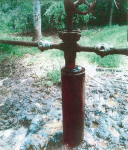- Like
- Digg
- Del
- Tumblr
- VKontakte
- Buffer
- Love This
- Odnoklassniki
- Meneame
- Blogger
- Amazon
- Yahoo Mail
- Gmail
- AOL
- Newsvine
- HackerNews
- Evernote
- MySpace
- Mail.ru
- Viadeo
- Line
- Comments
- Yummly
- SMS
- Viber
- Telegram
- Subscribe
- Skype
- Facebook Messenger
- Kakao
- LiveJournal
- Yammer
- Edgar
- Fintel
- Mix
- Instapaper
- Copy Link
| Updated1/29/2010 |
Information on Columbia/Chesapeake and Dominion Class Action Settlements [Updated1/29/2010]
If you are a mineral owner whose wells are owned by Columbia Natural Resources, LLC (formerly Columbia Natural Resources, Inc.), NiSource Inc., Columbia Energy Group and Chesapeake Appalachia, L.L.C. or Dominion Resources and are looking for information on the class action settlements visit the appropriate settlement website or call one of the toll free numbers below:
- Chesapeake (Columbia) – Web page: http://cnrsettlement.com/ Toll-free number: 1-888-925-4968
- Dominion – Web page: www.dominionclass.com Toll-free number: 1-866- 475-7755
See below for background and early WV-SORO updates on these royalty cases.
Additional information and resources for mineral owners can be found here.
Background Information on Columbia/Chesapeake and Dominion Class Action Settlements [Updated May 2009]
- Roane County gas royalties case settled
- Dominion Resources to pay $50 million in royalty settlement: 25,000 oil and gas owners to share money
- Plaintiffs celebrate royalty ruling: Oil, gas companies vow to appeal to U.S. Supreme Court
- Update November 15, 2008
Additional Information and Background
Mineral owners generally sign “leases” to operators/drillers. The leases almost always provide that the mineral owner gets paid a 1/8th “royalty”, and the operator keeps 7/8ths of the value of the gas in order to, theoretically, reimburse the operator for the cost of drilling the well, getting the gas to market etc.– plus a profit.
Most leases provide that the value of the gas is determined “at the well head” etc. That was where the operator sold the gas to someone who owned the gathering lines, who sold it to someone that processed the gas, who sold it to interstate pipelines, who sold it to the utilities, who sold it to consumers and businesses.
In the years after the leases were signed, this organization of the industry changed. Now the gas is only “sold” in an arms length transaction after it has been gathered and processed. The gas is worth more there because it has been gathered and processed. Operators did not want to pay mineral owners 1/8th of that value, since it was higher than the well head value.
So without re-negotiating the leases, often in violation of the lease language, and sometimes without even notifying the mineral owners, the operators subtracted expenses from the post-processing value before calculating the mineral owner’s 1/8th royalty. Mr. Tawney went to a lawyer because his royalty check was smaller than his neighbor’s. It turns out that not only were subtractions frequently in violation of the lease language, but the operators were fudging their expenses and subtracting all kinds of indefensible expenses, and using prices negotiated with wholly owned subsidiaries. Their legitimate 7/8’s was not enough.
A class action was brought against some of the producers. In a preliminary ruling the West Virginia Supreme Court agreed with the plaintiffs. Then after a trial, the jury gave a verdict of more than $133 Million in actual damages and $270 Million in punitive damages. After the trial, the trial judge made a ruling that the jury’s finding of punitive damages was proper. During the case the Circuit Court also made a ruling on “flat rate royalties” that will be helpful to small surface owners. If you have such a royalty provision, we suggest contacting a lawyer.
The oil and gas companies filed an appeal to the West Virginia Supreme Court on February 12, 2008. They alleged 64 errors by the Circuit Court in a monstrous155 page Petition for Appeal. WV SORO is considering filing an “amicus” (friend of the court) brief. No date has been set for argument.
The producers have already tried to get the Legislature to pass a statute in a special session getting them out of this and future verdicts. (Other class actions are filed against other producers.) WV SORO helped educate legislators about this from the surface owner/small mineral owner point of view, and the bill died. It will be back in the regular session beginning in January 2008.
The West Virginia Supreme Court turned down entirely the company’s appeal. After that happened the Companies filed an appeal to the United States Supreme Court alleging at least in part that West Virginia’s Supreme Court procedures are unconstitutional.
The grounds for the appeal to the United States Supreme Court was the fact that the West Virginia Supreme Court does not have to consider ever petition for appeal. In the Federal system and in most other systems, the appellate court has to consider the appeals of all parties who file in appeal. In West Virginia, a party that wants to appeal to the West Virginia Supreme Court files a petition and asks the court to consider the appeal Then the West Virginia Supreme Court decides whether to consider the appeal or not. (This is also the way that appeals to the United States Supreme Court are handled.)
Before the United States Supreme Court decided whether to hear the case (and it only considers a small percentage of petitions for appeal) the case was settled.
An October 24, 2008, newspaper article explains the settlement which is generally very good for the mineral owners!
If you are a mineral owner whose wells are owned by Columbia Natural Resources, LLC (formerly Columbia Natural Resources, Inc.), NiSource Inc., Columbia Energy Group and Chesapeake Appalachia, L.L.C. (“Defendants”), you can go to this web site to figure out what to do. Here is the news about when and how the money will be distributed from an early November, 2008, article in the Spencer, West Virginia paper.
The payment process for those entitled to payment from the class action is taking longer than expected. We understand that the Defendants keep records of who owns which wells for 10 years. There was a 10 year statute of limitaions, so the Plaintiffs were entitled to damages back ten years from the date the suit was filed. However the suit took several more years to come to a conclusion, and the Defendants did not change their file retention policies. As a result there are several early years for which the Defendnats no longer have records of who owns which wells. So when the first notices went out to the members of the Plaintiffs class, some of them pointed out that mistakes were made. This has resulted in a second set of {http://cnrsettlement.com/}












